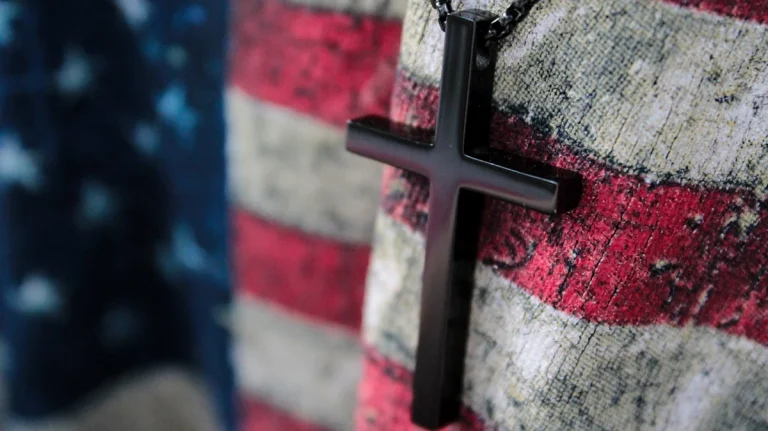In a country where 80 percent of adults believe the influence of religion is declining, white evangelicals stand out as the group most likely to want to see their faith reflected in the U.S. government.
According to a new investigation According to the Pew Research Center, most white evangelicals want a president who reflects their religious beliefs, believe the Bible should have some influence over American laws, and view removal from religion as a bad thing.
However, they oppose the adoption of Christianity as an official religion and very few (8%) have a “favorable” view of Christian nationalism.
Overall, nearly half of adults view the decline of religious influence in the country as a bad thing. White evangelicals are most likely to view the trend negatively, at 76 percent. The majority of other Christians, across all traditions, agree.
Most Americans want to see someone in the White House who defends their religious beliefs. Although few consider either candidate in the 2024 race to be particularly religious, more than two-thirds of white evangelicals believe Donald Trump is standing up for them.
Despite the growing buzz around Christian nationalism from candidates on the stump or on social media, Pew found that most Americans (54%) – and most Christians – have not heard of it at all. this term.
“Even those who believe that the United States should be a Christian nation and that the Bible should have great influence on the law, most are reluctant to say that they have a favorable view of Christian nationalism. So there seems to be some negative stigma around the term,” said Michael Rotolo, lead author of the report.
While a majority of Americans (44%) believe the government should promote Christian moral values, only 13% of respondents believe the government should declare Christianity the official religion.
More than half of Christians across all traditions agree on promoting Christian values, and about a quarter of white evangelicals, black Protestants, and Hispanic Protestants support formalizing the faith.
This was the first time Pew asked whether the federal government should officially declare Christianity the nation’s religion. Rotolo said Pew researchers found in a 2022 investigation that when people were asked what came to mind when they thought of a Christian nation, the answers were all over the place.
“It means things like the general direction of Christianity and society. This means that people have widespread faith in God. People didn’t even specify the Christian God. People were saying things like: A Christian nation means people believe in something,” Rotolo said. “So that’s what inspired us to ask this new question for the first time.”
In the latest report, nearly half of Americans (49%) believe scripture should influence laws in the United States. White evangelicals (86%), Hispanic Protestants (78%), and black Protestants (74%) are most likely to agree.
They’ve found in past surveys, Rotolo said, that people have varied views on what that means in practice. Some people, he said, might think that “the general moral teachings of the Bible would parallel what we see in the laws.”
Wanting the Bible to have more influence was much stronger on the right; 42% of Republicans and Republican-leaning independents believe that when the Bible and the will of the people are in conflict, “the Bible should have more influence.”
A majority of adults say they believe the Bible already has “some” influence on the laws of the land, and atheists and agnostics have the highest percentage (over 80% each) saying this is the case. The only group that does not have a majority saying the Bible has “not much” influence is black Protestants.
Slightly more Americans “report that their religion makes them part of a minority group” and see their beliefs in conflict with the dominant culture than four years ago.
Jewish and Muslim Americans were most likely to report that their faith placed them in a minority category compared to other religious traditions. White evangelicals were most likely to see cultural conflict, at 71%, although the majority of Jews and atheists said the same.
As another polarizing presidential race approaches, Americans are divided over exactly what the relationship between religion and public life should look like. A growing number of Americans want to avoid discussing religion altogether when interacting with people who disagree with them, rising from 33% in 2019 to 41% this year.
A majority (53%) say it is better to seek to “understand the other person’s point of view and agree to disagree,” but this is down from 62% in 2019 .
Only 5% say they believe proselytizing is the best approach to “trying to persuade the other person to change their mind.” White evangelicals, at 14 percent, are most likely to say the best approach is persuasion.


